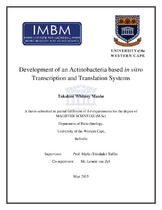Development of an actinobacteria based in vitro transcription and translation systems
Abstract
Heterologous metagenomic screening strategies have relied largely on the construction of DNA libraries and screening in Escherichia coli to access novel enzymes. There is an increased demand for the identification of novel lignocellulose degrading enzymes with enhanced biochemical properties which are suitable for applications in industrial processes; biofuels being one of them. The use of heterologous gene expression in function based metagenomic studies has resulted in the discovery of enormous novel bioactive compounds. However, there are limitations associated with using E. coli as a heterologous host which does not allow transcription and translation of all genes in the metagenome. E. coli can only express 40% of the environmental DNA because of promoter recognition, codon usage, and host toxicity of gene products. Therefore alternative strategies for expressing or producing novel enzymes are needed, which can also be employed in metagenomic gene discovery. In vitro protein synthesis is an important tool in molecular biology and used to obtain proteins from genes for functional and expression studies. These systems may hold the key to unlock more of the potential in metagenomic DNA. The broader aim of the study is to develop non- E. coli based cell-free protein synthesis systems to further the metagenomics screening. In this study, Rhodococcus erythropolis H8 was evaluated for its suitability in cell-free expression. Crude extracts containing the macromolecular components (70S or 80S ribosomes, tRNAs, initiation, elongation and termination factors) fromR. erythropolis were prepared using existing crude extract based cell-free protein synthesis (CFPS) protocols. Three genes were selected and used as templates for synthesis: cell11, xp12 and acetyl xylan esterase (axe10), all previously isolated from metagenomic libraries screened inE. coli. As judged by zymograms and enzyme assays, all enzymes were successfully expressedfrom their native promoters and in recombinants clones using the PtipA promoter, and wereactive. Furthermore, the amounts of XP12 protein produced using pFos-XP_12 was 1.2mg/mlfrom E. coli and 1.67mg/ml from R. erythropolis CFPS, showing that the R. erythropolismachinery was more efficient in the expression of XP12 than the E. coli machinery. To the best of our knowledge this is the first demonstration of a cell-free expression using an actinomycete.

